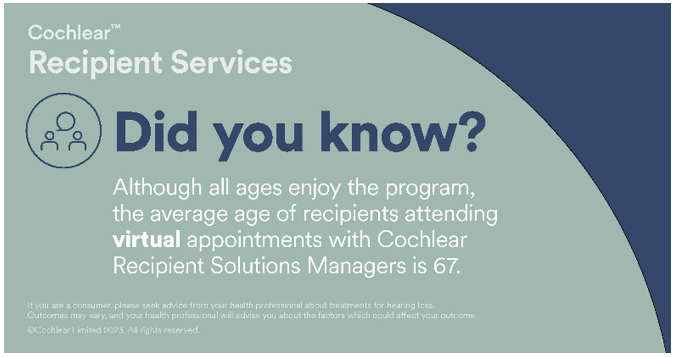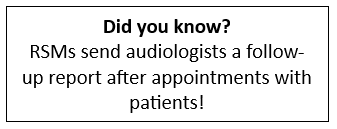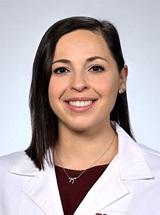By Elizabeth Sweet, Au.D, University of Pennsylvania Health System, Perelman Center for Advanced Medicine
With more candidates being referred for hearing implants than ever before, it’s imperative for clinics to reexamine clinical efficiency in order to meet the growing demands and adapt to the changing landscape of the hearing health industry. Recent data show that:
- Nearly all patients report that they are now comfortable with the use of telehealth for non-emergency care1
- 85% of adults aged 50+ own a smartphone and the technological gap between younger and older patients is closing2
Self-managed care, as part of Connected Care solutions, empowers your patients to actively manage their hearing outcomes in partnership with you, receiving care when and where they need it using the latest in digital technology.
This case study explores how the Cochlear Recipient Solutions Manager (RSM) Program can help enhance patient outcomes by fostering self-empowerment through a personalized and easy to use program, the linchpin of evolving patient expectations. This team of trained Cochlear professionals ranging from AuDs, SLPs, educators and beyond, provide a best-in-class virtual learning experience for new hearing implant recipients looking to increase confidence with their new devices and to achieve hearing goals.
Read on to hear from a fellow clinician:
Setting the scene
Your patient has decided to pursue a cochlear implant. They’ve undergone surgery and healed, and now they’re in your office for activation! You’ve finished your programming for your patient, they’re hearing sounds again and now the time has come to show them how to use their devices.
With your eight years of education in Audiology and multiple years of clinical experience, you could likely change batteries and pair a Mini Microphone 2+ in your sleep! Your patient, however, maybe has seen these devices in person or online only once. They’re trying to acclimate to this new way to hear while also absorbing all of the information on these devices that they are expected to use on their own. This is why activation appointments can sometimes feel overwhelming for you and your patients as there is a long list of topics to cover.
Instead of rushing through all these topics, I decided to change my approach – I now program and demonstrate enough that the patient can go home and use their new device then schedule an appointment with our local Cochlear RSM to cover the following:
- Programming
- Counseling on how to charge batteries
- Teaching patients how to use the Zephyr Dry & Store
- Practicing how to put on the sound processor
- Registering for a Cochlear Account
- Setting up phone streaming
- Explaining progressive MAPs
- Discussing the extensive list of other topics that our patients need to know about their new devices
Within a few weeks, I found that patients were returning to me with less questions and expressing feeling more confident with their devices which, in turn, gave us more time for programming and evaluating progress.
Below, I outline the story of a patient with whom my RSM and I partnered together to provide quality care.
Case study
Meet John (name changed for privacy):

John is a 67-year-old man who recently retired from a corporate job. He now spends his time with his grandchildren and tutoring high school students in math. When I met him for his candidacy evaluation appointment, he was utilizing binaural amplification but was interested in learning about cochlear implants. Though he reported struggling to hear on the phone during these activities, he did not believe his hearing was “bad enough” at that point to really consider surgery.
Following testing and counseling, John decided to pursue cochlear implantation with two Nucleus® 8 Sound Processors, the Mini Microphone 2+, TV Streamer and an extra rechargeable battery. His surgery went well and before we knew it, he was back for activation. John is a real go-getter and he approached the cochlear implant process wanting to learn and do all that he could to be successful.
On activation day, I created John’s initial MAP and counseled him on how to change/charge his batteries, how to put on his device and how to move through his progressive MAPs. We scheduled his appointment with our local RSM to review what we had talked about as well as other topics he was eager to learn about.

At the end of our appointment, he expressed feeling “excited but overwhelmed.” One week later, John arrived at his next follow-up expressing confidence in his ability to use his devices. He had paired his processor to his phone, started aural rehabilitation using the Cochlear Copilot app and was all ready to begin using his Mini Microphone 2+ during his tutoring sessions to better hear the students around him! Accessories can seem to get pushed to the wayside to allow for more programming and counseling on the basics, but because of his appointment with an RSM, John was in a more secure spot than he would have been if I had squeezed all of that information into our short time together. When asked about his experience with the RSM, John said, “ It made me much more comfortable with the processor and I’m able to hear the TV very well without blasting my wife out of the room!” It was a great feeling to see John expressing confidence and independence in such a short time.
Outcomes
The progress John displayed so quickly is now the norm for many of the recipients I see and it is thanks to the support from our RSM. The Cochlear RSM Program has become invaluable in my personal practice as it gives patients the tools to cultivate independence with their devices, and therefore lessen the load placed on our clinic. I can spend more time on what is most important to the patient and in many cases, save them an extra trip to the clinic to discuss topics that the RSM is more than qualified to handle. My RSM has become instrumental in the success of my recipients and saved me valuable time and resources.
Learn about all of the support services that Cochlear provides to help our partners be successful: 2023 Connected Care and Service Report
It’s easy to schedule an appointment with your local RSM on behalf of your patient. Click here to start!
About the author:

Elizabeth Sweet, Au.D, CCC-A is a doctor of audiology within the Division of Audiology in the Department of Otorhinolaryngology Audiology-Head and Neck Surgery. She has clinical expertise in the diagnosis and management of hearing disorders, hearing aids, and cochlear implants. Dr. Sweet strives to provide compassionate and personalized care to improve the quality of life for her patients.
- Doctor of Audiology – University of Pittsburgh, Pittsburgh, PA
- Bachelor of Arts – University of Pittsburgh, Pittsburgh, PA
- Member of the American Academy of Audiology
- Certificate of Clinical Competence in Audiology, American-Speech-Language and Hearing Association
- Predmore ZS, Roth E, Breslau J et al (2021) Assessment of patient preferences for telehealth in post-COVID-19 pandemic health care. JAMA Netw Open, 4(12):e2136405
- Kakulla B. (2021) Tech Trends and the 50-plus: Top 10 biggest trends [Internet]. Washington DC: AARP Research, 20212. [cited 2021 Nov 24]. Available from https://doi.org/10.26419/res.00420.001


